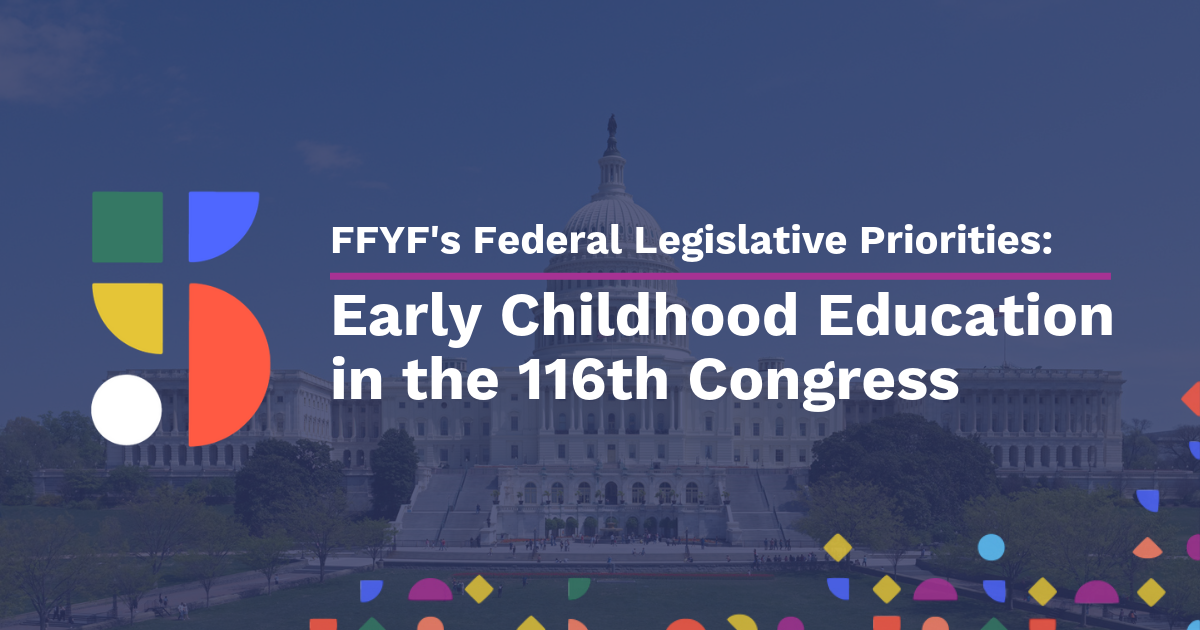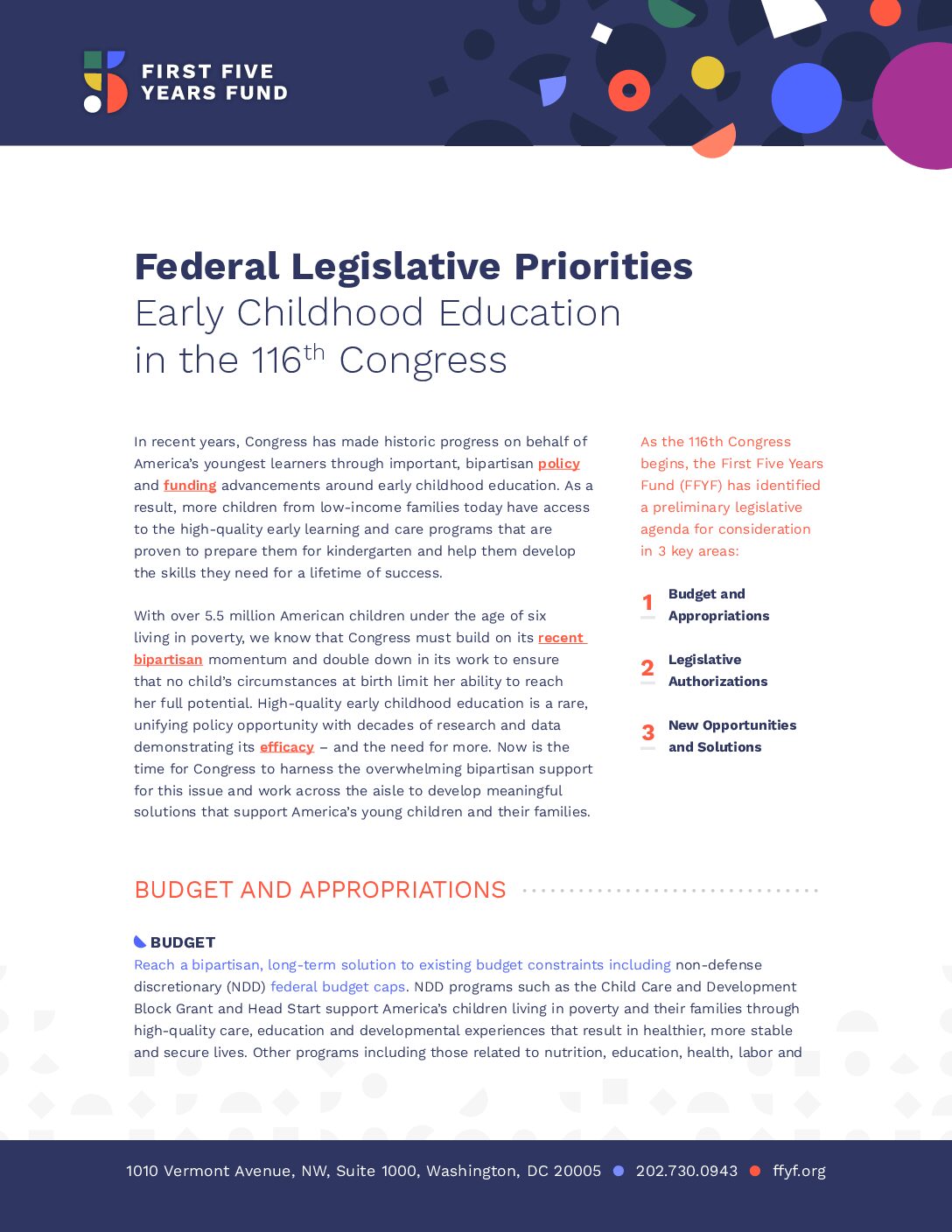Federal Legislative Agenda: Early Childhood Education in the 116th Congress

In recent years, Congress has made historic progress on behalf of America’s youngest learners through important, bipartisan policy and funding advancements around early childhood education. As a result, more children from low-income families today have access to the high-quality early learning and care programs that are proven to prepare them for kindergarten and help them develop the skills they need for a lifetime of success.
With over 5.5 million American children under the age of six living in poverty, we know that Congress must build on its recent bipartisan momentum and double down in its work to ensure that no child’s circumstances at birth limit their ability to reach their full potential. High-quality early childhood education is a rare, unifying policy opportunity with decades of research and data demonstrating its efficacy – and the need for more. Now is the time for Congress to harness the overwhelming bipartisan support for this issue and work across the aisle to develop meaningful solutions that support America’s young children and their families.
As the 116th Congress begins, the First Five Years Fund (FFYF) has identified a preliminary legislative agenda for consideration in 3 key areas:
-
- Budget and Appropriations
- Legislative Authorizations
- New Opportunities and Solutions
BUDGET AND APPROPRIATIONS
BUDGET
Reach a bipartisan, long-term solution to existing budget constraints including non-defense discretionary (NDD) federal budget caps. NDD programs such as the Child Care and Development Block Grant and Head Start support America’s children living in poverty and their families through high-quality care, education and developmental experiences that result in healthier, more stable and secure lives. Other programs including those related to nutrition, education, health, labor and transportation, bolster the economy, drive the United States’ global competitiveness, and support the well-being of children and families.
- Craft a budget deal that provides relief for NDD and provides subcommittees with increases in their allocations commensurate to the size of their bills, so that programs can adequately serve children and working families.
- Ensure that any offsets do not harm children and vulnerable Americans by short-changing important essential supports that ensure nutrition, health care, or other services.
APPROPRIATIONS
Sustain and increase investments in key early childhood programs to ensure they are properly and sufficiently funded to accomplish the goals and activities authorized by law. For example, at current funding levels, 31 percent of eligible children ages 3 through 5 have access to Head Start, and only 7 percent of eligible children under age 3 have access to Early Head Start. The Child Care Development Fund and related programs only serve 15 percent of federally eligible children. It is imperative that Congress continue to increase appropriations to these and other programs to ensure quality standards are met and more children are reached.
- Child Care and Development Block Grant (CCDBG) High-quality child care and early education is essential to the success of our children – and our future workforce. And affordable, reliable child care is crucial for the parents in our current workforce. Yet, the high cost of child care is one of the greatest expenses families face each month, straining family budgets and making it extremely challenging for them to afford high-quality arrangements that adequately support their children’s healthy development. Funding is necessary to implement the most recent reauthorization with fidelity, including to:
- Ensure more children from low-income families have access to high-quality programs and providers.
- Implement health and safety provisions.
- Provide training and professional development for teachers and staff to support child development.
- Develop strategies for increasing supply and quality of services for children in underserved areas, infants and toddlers, children with disabilities, and children in non-traditional hour care, as well as procedures to promote access for homeless families.
- Head Start/Early Head Start Head Start and Early Head Start offer early learning, health, nutrition, and family support services to low-income families and children from birth to age five. The programs take a comprehensive approach to meet the needs of both children and parents through high-quality care and education in coordination with complementary public assistance at the local, state and federal level to meaningfully support positive child and family outcomes. Services are diverse, localized and targeted at those most in need in order to respond to both family and community demand. Funding will:
- Increase participations rates as current funding only allows the program to serve one-third of eligible three- and four- year-olds in Head Start, and only about 7 percent of eligible infants and toddlers in Early Head Start.
- Enable programs to implement the recently revised performance standards and make ongoing quality improvements, including providing families with access to full-day full-year services.
- Expand Early Head Start, and the Early Head Start-Child Care Partnerships.
- Preschool Development Grants Birth Through Five The Preschool Development Grant Birth Through Five (PDG B-5) program was established in the bipartisan Every Student Succeeds Act (ESSA) and supports states in expanding and strengthening their early childhood education programs for children from birth through age 5. Initial funding is supporting 46 states and territories to conduct strategic planning and needs assessments of their own early childhood landscapes. Continued funding is necessary to:
- Support an additional 3 years of funding so states can fully implement PDG B-5 scopes of work that will focus on improving birth to five learning and care systems in order to set up more children, especially those from low-income families, to succeed in elementary school and beyond.
- Build upon existing federal, state, and local early care and learning investments by encouraging states to invest in well-designed, high performing early childhood systems, which include strong partnerships and transitions between early learning and K-12 education, to provide more children with high-quality learning and care opportunities.
- Individuals with Disabilities Education Act – Parts B and C Early intervention (Part B) services support infants and toddlers with disabilities and their families beginning in the early developmental years, potentially reducing the need for costlier supports in later years. Through the Grants for Infants and Families program (Part C), states implement systems of coordinated, comprehensive, multidisciplinary, interagency programs and make early intervention services available to children with disabilities, birth through age two, and their families. Funding for these two programs will:
- Incentivize states to provide for a seamless transition from the very first stages of a child’s development into early education and then elementary school.
- Expand the capability for states and communities to ensure all children with disabilities, ages three through five, have access to preschool.
PROGRAM REAUTHORIZATION
There are a number of early childhood programs due for reauthorization during the tenure of the 116th Congress. Congress should conduct hearings and stakeholder engagement to determine if these programs are ready to be considered for reauthorization. If so, an emphasis should be placed on how best to ensure reauthorization is leveraged to increase access to, and the quality of early care and education for those most at risk.
- Temporary Assistance for Needy Families (TANF) Under current law, a state has the flexibility to utilize TANF funds to support low-income families through increased access to child care and early education opportunities. Much of the progress at the state and local levels around investments in early childhood education has been made possible through strong partnerships with the federal government aimed at expanding access and increasing quality. TANF plays a particularly important role as a funding source that states can use for child care and early education, which allows parents the freedom to enter or return to the workforce. Reauthorization provides the opportunity to better:
- Reinforce the connection between federal funding and quality programs, including expanding states ability to use TANF dollars to increase the reach of the Child Care and Development Block Grant.
- Identify ways to build and sustain child care funding in order to support TANF families.
- Maintain the ability of states to direct TANF dollars to their own high quality early learning and care initiatives.
- Ensure states are supplementing rather than supplanting their own spending with TANF dollars.
- Higher Education Act (HEA) Given the overwhelming evidence showing a teacher’s education and training is crucial to the quality of an early childhood education classroom, reauthorization of HEA presents an opportunity to positively impact child outcomes by strengthening the early childhood education workforce. Key areas of prioritization should:
- Strengthen teacher preparation, which will build on national efforts to improve early childhood educator effectiveness. Improving educator preparation will ensure early learning teachers have the knowledge and tools they need.
- Ensure communities are able to recruit and retain early childhood educators by investing in financial assistance and supports necessary for new and existing teachers to attain specialized early childhood training and skills.
- Promote access and completion by supporting programs that help student-parents achieve postsecondary success, including reauthorization of the Child Care AccessMeans Parents in Schools (CCAMPIS) program. The ability to access high-quality child care for undergraduate students with children is one of the many factors that can determine whether a student persists and graduates.
- For more details see FFYF’s recommendations for the reauthorization of the Higher Education Act.
- Child and Adult Care Food Program (CACFP) Authorized as part of the Child Nutrition Act, CACFP provides critical food supports to children and families enrolled in early childhood programs. Nutrition plays a key role in a child’s ability to learn and thrive, and early learning programs are often the most efficient delivery for such assistance. As such, reauthorization could:
- Eliminate participation barriers for programs and providers by reducing CACFP paperwork, expanding direct certification, and reforming the reimbursement system for family child care providers.
- Maximize the program’s potential by increasing reimbursement rates to fully cover the cost of meals.
- Permit 3 meals per day in early learning and care settings with extended and/or nontraditional hours.
- The Education Sciences Reform Act (ESRA) ESRA is an important support to all education programs. In the case
of early childhood education, data use plays a vital role in establishing policies and practices that improve child outcomes. Reauthorization can:- Address the national need to improve early learning data access and use within states, as well as to align with the Every Student Succeeds Act (ESSA).
- Ensure data sharing through linked systems and coordinated collection efforts in order to use data effectively for decision-making, research and continuous improvement.
Individuals with Disabilities Education Act (IDEA) Early Intervention (Part C) is a critical component of high-quality early childhood programs mitigating the negative effects of certain biological and environmental factors on child development. It is of paramount importance that a strong system of shared responsibility for students with developmental delays and/or disabilities is implemented at the state and local levels. Coordination between Part B (Special Education) and Part C must be strengthened to ensure children receive services during the preschool and early childhood years. Additionally, IDEA reauthorization should:
- Secure permanent authorization and adequate funding for educationally and cost-effective early intervention efforts (Part C) to meet the need nationally.
- Build strong coordination to ensure students with developmental delays and/or disabilities are served during the preschool and early childhood years.
- Enhance early intervention efforts that provide classroom-based instructional strategies and supports for children with developmental delays and/or disabilities within the general education classroom.
- Provide greater financial and other supports to states and local agencies to increase the number of professionals specifically trained to provide high-quality early intervention services to infants and toddlers and their families.
- Head Start Act Head Start/Early Head Start promotes school readiness of children from birth through age five from low-income families through education, health, social and other services. The program exemplifies how early learning and care programs must support the whole child and can be adapted to meet the unique needs of a community. Head Start programs across the country are working to implement updated performance standards that will serve to expand high-quality care. Reauthorization should be informed by these implementation efforts and explore ways to maintain the core of the Head Start program while increasing access for the nation’s most vulnerable children and families, especially for infants and toddlers. Additional areas for consideration might include:
- How best to assess community and program needs as it relates to the number of 3- and 4-year olds served by Head Start programs, and infants and toddlers in Early Head Start programs, compared to the unmet need.
- Authorize the Early Head Start – Child Care Partnerships program and draw from the past 3 years of implementation.
- Explore ways to create a more seamless continuum of care by linking Early Head Start more closely to other early learning programs in the community, specifically the Maternal Infant and Early Childhood Home Visiting (MIECHV) program.
- Establish Head Start as a trauma-informed early childhood environment for all children by embedding a trauma intervention model as a component of the Head Start performance standards.
- Support community partnerships, for example those between Head Start and institutions of higher education as a way to imbed a professional development system within high-quality early learning.
- Child and Dependent Care Tax Credit (CDCTC) The tax code should be strengthened to provide relief for working families struggling with the cost of child care, particularly those of modest means. Therefore, the CDCTC should be strengthened to provide a more robust tax incentive for quality care. In order to do this:
- Increase the value of the CDCTC, which has largely remained stagnant while the cost of care to families continues to rise.
- Make the CDCTC refundable so that low- and middle-income working parents are able to receive it.
NEW OPPORTUNITIES AND POLICY SOLUTIONS
The crucial programs and investments that exist at the federal level have made a meaningful difference in the lives of children and families for generations. Yet we know that more must be done in order for all eligible children to have access to the life-changing early childhood education opportunities they need. Members of the 116th Congress have the opportunity to not only double down in their support for existing programs like CCDBG, Head Start and Preschool Development Grants, but also develop new and innovative solutions to the problems faced by American families. Whether it be a comprehensive solution like the Child Care for Working Families Act or more targeted proposals aimed at addressing individual policy needs, we encourage Congress to engage in conversations about how to see greater gains for children. A variety of early learning policy proposals, big and small, will be required to take America from where we are to where we need to be. And the best way to develop those proposals will be through a robust exchange of ideas between lawmakers on both sides of the aisle.
For any questions or to set up a meeting with a member of the FFYF team regarding your own policy proposals, please contact Sarah Rubinfield at srubinfield@ffyf.org.
Subscribe to FFYF First Look
Every morning, FFYF reports on the latest child care & early learning news from across the country. Subscribe and take 5 minutes to know what's happening in early childhood education.




